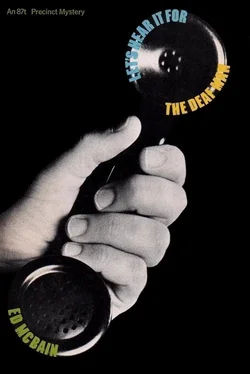He still thought wistfully of what he might have become — a Cary Hawes, or a Paul, or a Carter, or a Richard. But more than any of those, the name he most cherished (and he had never revealed this to a soul) was Lefty. Lefty Hawes. Was there a criminal anywhere in the world who would not tremble at the very mention of that dread name, Lefty Hawes? Even though he was right-handed? Hawes thought not. Sighing, he moved the picture of the first president so that it was directly below him on the desk top. Fiercely, he stared into those inscrutable eyes, challenging them to reveal the Deaf Man’s secret. Washington never so much as blinked back. Hawes stretched, yawned, picked up the photostat, and carried it to Carella’s desk, where it would be waiting when he got back to the office.
The tall blond man, hearing aid in his right ear, came through the revolving doors of the bank at fifteen minutes before noon. He was wearing a custom-tailored beige gabardine suit, an oatmeal-colored shirt, a dark brown tie, brown socks, and brown patent leather shoes. He knew from his previous visits to the bank that there were cameras focused on the area just inside the revolving doors, and cameras covering the five tellers’ cages on the left as well. The cameras, if they operated like most bank cameras he had investigated, took a random picture once every thirty seconds, and did not begin taking consecutive and continuous frames for a motion picture unless activated by a teller or some other member of the bank’s staff. He had no fear of his picture being taken, however, since he was a bona-fide depositor here on legitimate business.
He had been here for the first time a month ago, on legitimate business, to deposit $5,000 into a new savings account that paid 5 percent interest if the money was not withdrawn before the expiration of ninety days. He had assured the assistant manager that he had no intention of withdrawing the money before that time. He had been lying. He had every intention of withdrawing his $5,000, plus $495,000 more, on the last day of April. But his visit to the bank had been legitimate.
On two occasions last week, he had again visited the bank on legitimate business — to make small deposits in the newly opened account. Today, he was here on further legitimate business — to deposit $64 into the account. In addition, he was here to determine exactly how he would deploy his task force of five on the day of the robbery.
The bank guard stood just inside the revolving doors, at almost the exact focal point of the camera on the left. He was a man in his sixties, somewhat paunchy, a retired mailroom clerk or messenger who wore his uniform with shabby authority and who would probably drop dead of fright if he was ever forced to pull the.38 caliber revolver holstered at his side. He smiled at the Deaf Man as he came into the bank, his patent leather shoes clicking on the marbled floors. The Deaf Man returned the smile, his back to the camera that angled down from the ledge on the right of the entrance doors. Immediately ahead of him were two marble-topped tables secured to the floor and compartmentalized below their counters to accommodate checking-account deposit slips and savings-account withdrawal and deposit slips. He walked to the nearest table, stood on the side of it opposite the tellers’ cages, and began a quick drawing.
Looking into the bank from the entrance, there were three cages on the right side. He stood facing those cages now, his back turned to the clerical office and the loan department. Angling off from these, and running across the entire rear wall of the bank, was the vault, its shining steel door open now, its body encased in concrete and steel mesh interlaced with wires for the alarm system. There was no feasible way of approaching that vault from above it, below it, or behind it. The assault would have to be head-on, but not without its little diversions.
Smiling, the Deaf Man considered the diversions. Or, to be more accurate, the single diversion that would ensure the success of the robbery. To say that he considered the police antiquated and foolish would have been unfair to the enormity of his disdain; in fact, he considered them obsolete and essentially hebephrenic. Paradoxically, the success of his scheme depended upon at least some measure of intelligence on the part of his adversaries, so he was making it as simple as he could for them, spelling it out in pictures because he sensed words might be too confusing. He had begun explaining exactly where and when he would strike, and he had played fair and would continue to play fair; cheating the police would have been the equivalent of tripping a cripple in a soccer match. Although he suspected himself of sadistic tendencies, he could best exorcise those in bed with a willing wench rather than take advantage of the bumbleheads who worked in the 87th Precinct. He looked upon them almost fondly, like cretinous children who needed to be taken to the circus every now and then. In fact, he rather liked the concept of himself as a circus, complete with clowns and lion-taming acts and high-wire excitement, a one-man circus come to set the city on its ear again.
But in order for the diversion to work, in order for the spectator’s eye to become captured by the prancing ponies in the center ring while man-eating tigers consumed their trainer in the third ring, the diversion had to be plain and evident. The key to his brilliant scheme (he admitted this modestly), the code he had concocted, was simple to comprehend. Too simple? No, he did not think so. They would learn from the photostats only what he wanted them to learn; they would see only the ponies and miss the Bengal tigers. And then, thrilled with their own perception, inordinately proud of having been able to focus on the flashing hoofs, they would howl in pain when bitten on the ass from behind. All fair and above board. All there for the toy police to see, if only they were capable of seeing, if only they possessed the brains of gnats or the imagination of rivets.
The Deaf Man finished his floor plan of the bank. He folded the deposit slip as though he had been making money calculations in the secret manner of bank depositors everywhere, put it into his pocket, and then took another slip from the rack. He quickly filled it out, and walked to the nearest teller’s cage.
“Good morning, sir,” the teller said, and smiled pleasantly.
“Good morning,” the Deaf Man said, and returned the smile. Bored, he watched as the teller went about the business of recording the deposit. There were alarm buttons on the floor behind each of the tellers’ cages and scattered elsewhere throughout the bank. They did not overly concern him.
The Deaf Man thought it fitting that a police detective would help him rob the bank.
He also thought it fitting that the police detective who would lend his assistance was Steve Carella.
Things had a way of interlocking neatly if one bided his time and played his cards according to the laws of permutation and combination.
“Here you are, sir,” the teller said, and handed back the passbook. The Deaf Man perfunctorily checked the entry, nodded, slipped the book back into its plastic carrying case, and walked toward the revolving doors. He nodded at the security guard, who politely nodded back, and then he went into the street outside.
The bank was a mile outside the 87th Precinct territory, not far from three large factories on the River Harb. McCormick Container Corp. employed 6,347 people. Meredith Mints, Inc. employed 1,512. Holt Brothers, Inc. employed 4,048 for a combined work force of close to twelve thousand and a combined payroll of almost $2 million a week. These weekly salaries were paid by check, with roughly 40 percent of the personnel electing to have the checks mailed directly to banks of their own choice. Of the remaining 60 percent, half took their checks home to cash in supermarkets, whiskey stores, department stores, and/or banks in their own neighborhoods. But some 30 percent of the combined work force of the three plants cashed their checks each and every week at the bank the Deaf Man had just visited. Which meant that every Friday the bank expected to cash checks totaling approximately $600,000. In order to meet this anticipated weekly drain, the bank supplemented its own cash reserve with money shipped from its main branch. This money, somewhere in the vicinity of $500,000, depending on what cash the bank already had on hand, was delivered by armored truck at nine-fifteen each Friday morning. There were three armed guards on the truck. One guard stayed behind the wheel while the other two, revolvers drawn, went into the bank carrying two sacks of cash. The manager accompanied them into the vault, where they deposited the money, and then left the bank, revolvers now holstered. At eleven-thirty the cash was distributed to the tellers in anticipation of the lunch-hour rush of factory workers seeking to cash their salary checks.
Читать дальше












